Do dental implants hurt? Everything you need to know
Are you considering dental implants? Discover how to effectively manage pain and recover with modern dentistry.

Your ultimate guide to dental implant pain management
Worried about dental implant pain? You're not alone. This is one of the most common concerns among those considering dental implants. However, the benefits of this procedure far outweigh the temporary discomfort. In this post, we'll demystify the process and provide you with all the information you need to make your dental implant journey more comfortable.
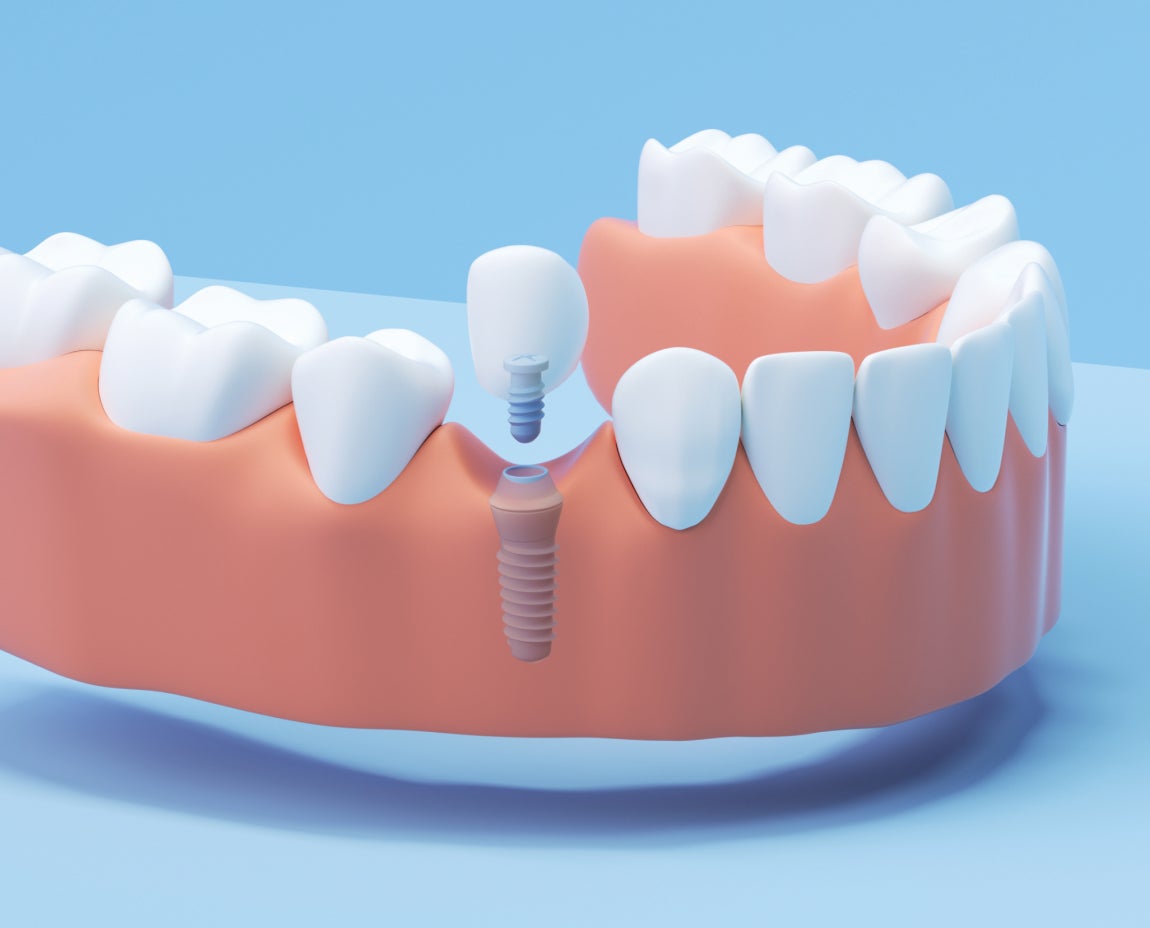
Dental implants and their importance in modern dentistry
Dental implants have revolutionized modern dentistry, offering a permanent solution for individuals with missing teeth. They have become the go-to option for restoring smiles and improving oral health.
Dental implants are artificial tooth roots made from bio-compatible materials like titanium. They provide a strong foundation for fixed implants or removable dentures with implants designed to match your natural teeth. But why should you consider them?
First, dental implants offer a long-term solution to missing teeth. Unlike dentures, which can slip out of place, implants provide stability and function just like your natural teeth. They also help preserve your jawbone and support bone strength. Implants also improve your ability to chew and speak, enhancing your overall quality of life.
But, as with any implant procedure, the question on everyone’s mind is—are dental implants painful? This blog aims to unravel the truths and myths surrounding dental implant pain, pain management tips and guiding you through what to expect before, during and after the procedure.
Debunking the common misconception about dental implant pain
Many people avoid getting dental implants due to fear of pain. However, advances in dental technology and anesthetics have made the procedure much more comfortable than most people think.
During the actual implant procedure, patients are typically under local anesthesia, which could help you feel more comfortable during the surgery. Some may experience pressure or mild discomfort, but it's far from the unbearable pain some fear. Post-surgery, our clinicians will work with you to manage any discomfort, which is usually management with over-the-counter pain medications and other pain management and expert tips.
A breakdown of the dental implant surgical process and post-operative pain management
The surgical process
Understanding the dental implant procedure can ease your anxiety. Here's a step-by-step breakdown:
1. Initial consultation:
Your dentist will assess your oral health, take dental X-rays, and discuss your treatment plan.
2. Surgical procedure:
The implants are placed into your jawbone. This surgery is usually done under local anesthesia, and sedation can be provided for added comfort.
3. Osseointegration:
This is the healing phase where the implant integrates with your jawbone. This can take several weeks to a few months to heal. You are given a temporary denture while your implants heal.
4. Abutment placement:
Once osseointegration is complete, a small connector called an abutment is attached to the implant.
5. Crown placement:
Finally, a custom-made dental prosthetic, like a crown, bridge or denture prosthetic, is placed on the implant abutment, and your smile will be restored.
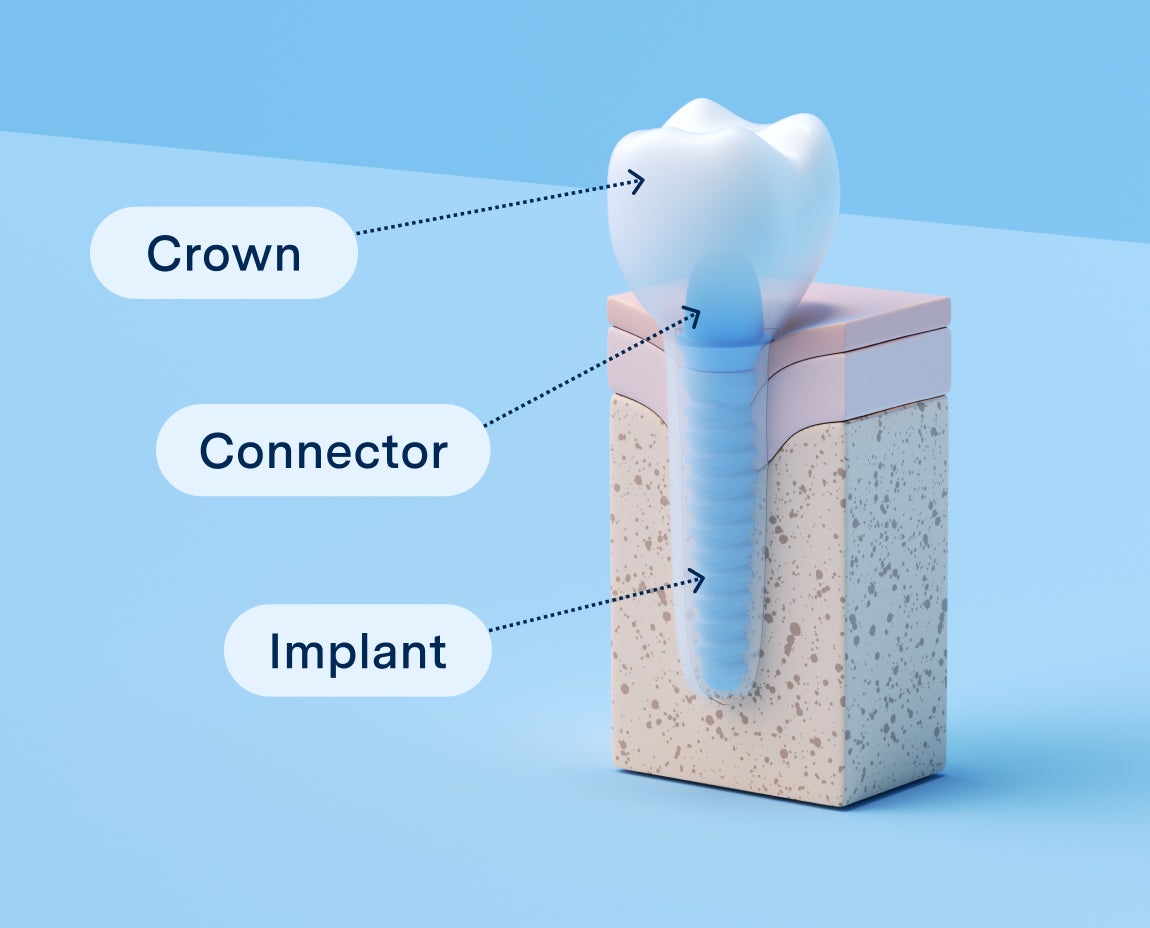
Pain during the procedure
One of the biggest concerns is the pain during the implant procedure. Let's address this head-on.
During the surgery, you will be given local anesthesia to numb the area. This should help to limit the pain during the actual implant placement. For those who are particularly anxious, other sedation options may be available to make the experience more comfortable. You and your implant expert will discuss your sedation needs prior to your surgery.
You might feel some pressure or vibrations during the surgery, but these sensations are generally well-tolerated by most patients and less than what most report.
Modern pain management techniques have significantly reduced discomfort associated with dental procedures. Rest assured, your dentist at Aspen Dental will take every step to ensure you are comfortable throughout the process.

Managing post-operative pain and discomfort
After the anesthesia wears off, it's normal to experience some discomfort. This is usually mild to moderate and can be managed with over-the-counter pain relievers like ibuprofen or acetaminophen. It's comparable to the discomfort you might feel after a tooth extraction.
You may also experience some swelling and bruising in the area, which is a natural part of the healing process. These symptoms typically peak within 48 hours and then gradually subside. Your dentist will provide you with post-operative care instructions to help manage these symptoms and ensure a smooth recovery.
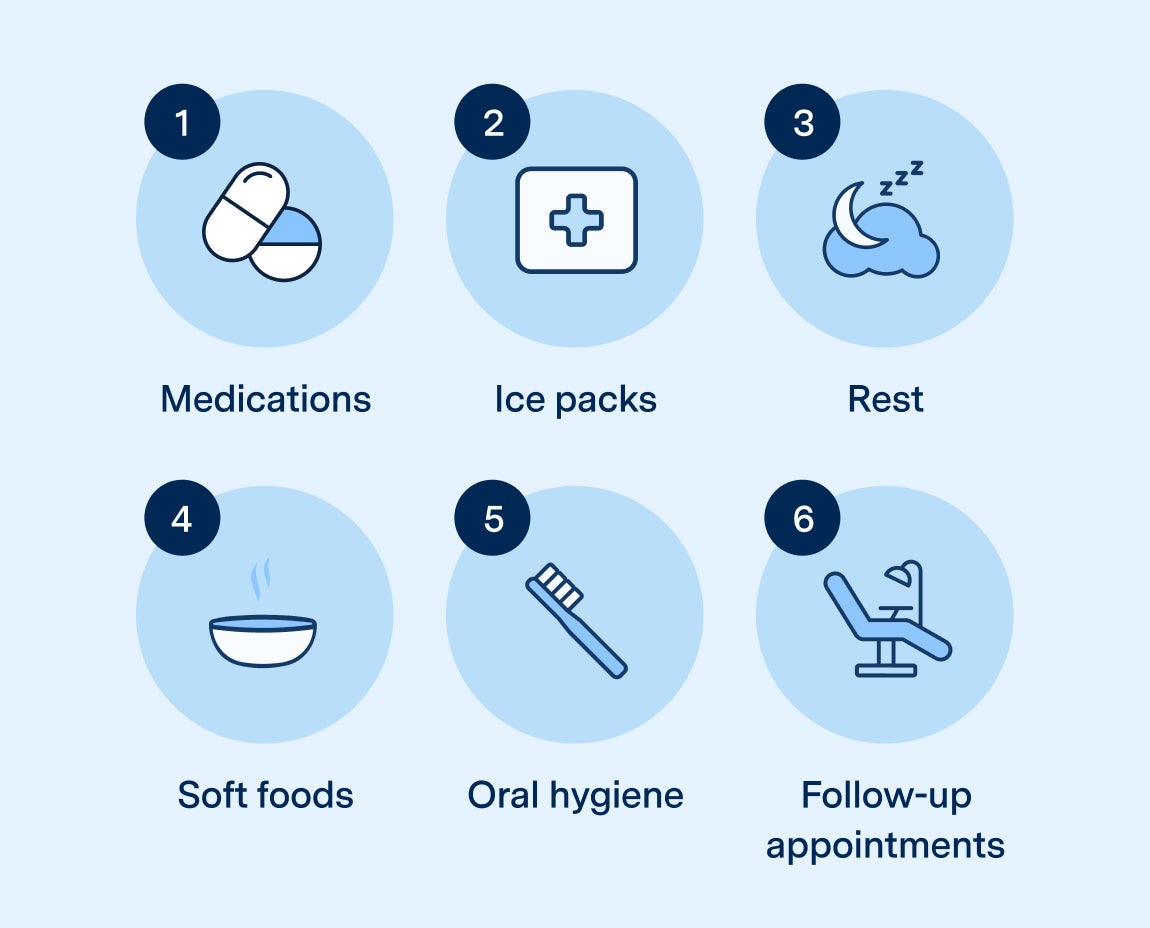
Tips for reducing pain and swelling
Patients can also follow simple tips to reduce pain and swelling, such as applying ice packs to the affected area, eating soft foods and avoiding strenuous activities for a few days. Good oral hygiene is essential in preventing infection and in promoting healing.
Here are some practical tips:
Medications
Take prescribed pain relievers as directed by your dentist. Over-the-counter options can also be effective.
Ice packs
Apply ice packs to the outside of your face for 15 minutes at a time to reduce swelling.
Rest
Allow your body to heal by getting plenty of rest. Avoid strenuous activities for a few days.
Soft foods
Stick to soft foods like yogurt, mashed potatoes and smoothies for the first few days. Avoid hot, spicy or crunchy foods that could irritate the surgical site.
Oral hygiene
Keep your mouth clean by gently rinsing with a saltwater solution. Avoid brushing the surgical site for a few days.
Follow-up appointments
Attend all scheduled follow-up appointments to monitor your healing and address any concerns.
Following these tips can help you manage discomfort and speed up your recovery.
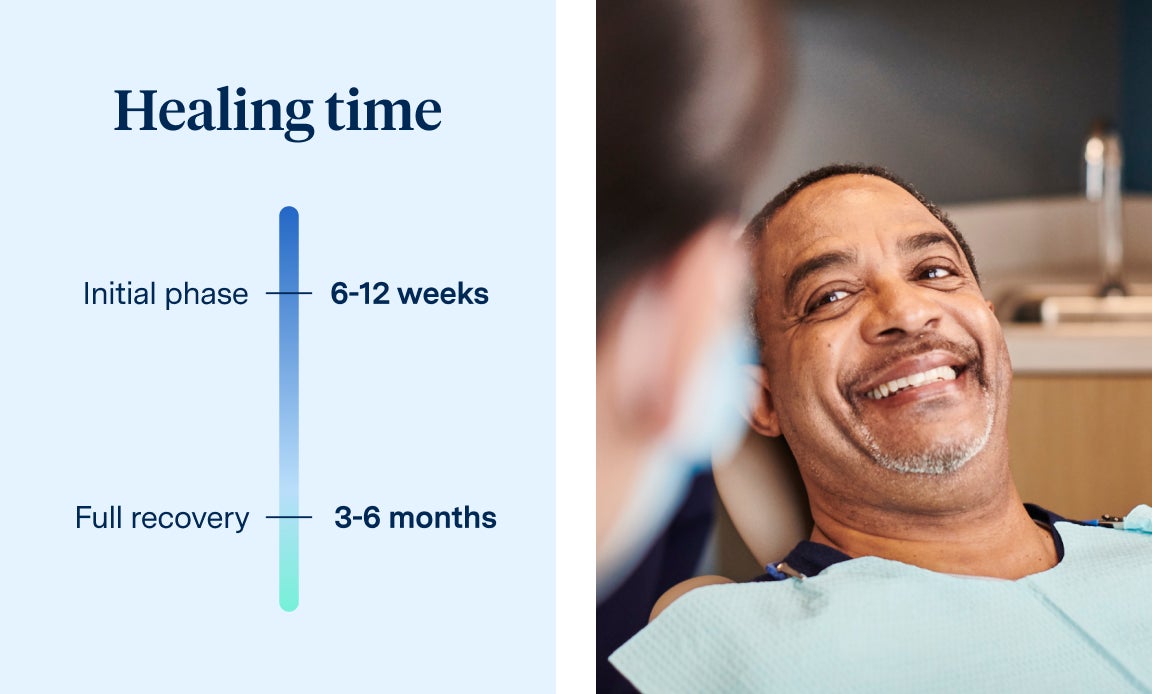
How long does it take to heal after dental implant surgery
Healing times after dental implant surgery can vary widely depending on several factors, including your overall health, the complexity of the surgery and the number of implants placed. Generally, the initial healing phase, where the implant integrates with the bone, takes about 6 to 12 weeks. However, full recovery and the complete fusion of the implant with the jawbone might take anywhere from 3 to 6 months. It's important to follow your dental implant expert’s aftercare instructions closely to ensure the best outcome and to address any concerns immediately.
Patient testimonials and expert insights on the actual pain experience
Hearing from those who have undergone the procedure can provide valuable insights. Many patients report that the fear of pain was worse than the actual experience. Here's what some have to say:
Carter’s story
“Before Aspen, dental visits left me trembling with fear. The entire care team quickly put me at ease, making me feel safe and comfortable. Through two surgeries, their care has been phenomenal. Now, Aspen is our family's dental home, and I'm spreading the word!”
—Carter G. Port Arthur, TX

Dental implants 101
“Dental implants can be performed with state of the art techniques which are minimally invasive and patients feel minimal discomfort after the procedures. Implant placement is a life changing procedure that typically is managed with over the counter pain medications and patients are usually unexpectedly pleased with how quickly they recover."
—Sundeep Rawal
SVP Implant Support Services

Tips for choosing the right dentist for your implant procedure
At Aspen Dental, we understand the importance of selecting the right dental professional for a comfortable and smooth implant experience. With our team of qualified and experienced dentists and oral surgeons, we specialize in dental implants, ensuring you're in expert hands.
Here’s why choosing Aspen Dental for your dental implants can make all the difference:
Expertise and qualifications
Our professionals are not only highly qualified but also have extensive experience in performing dental implants, ensuring you receive the best care possible.
Patient reviews
We're proud of the positive feedback from our patients. Reading their testimonials can give you insight into their experiences and the quality of care we provide.
Open communication
We believe in transparent, open communication. Feel free to ask us any questions about the procedure, how we manage pain, and our approach to caring for our patients. We’re here to make sure you feel supported and informed every step of the way.
Choosing Aspen Dental means prioritizing your comfort and confidence throughout the dental implant process as well as resting easy in the hands of industry-experts for implant solutions.
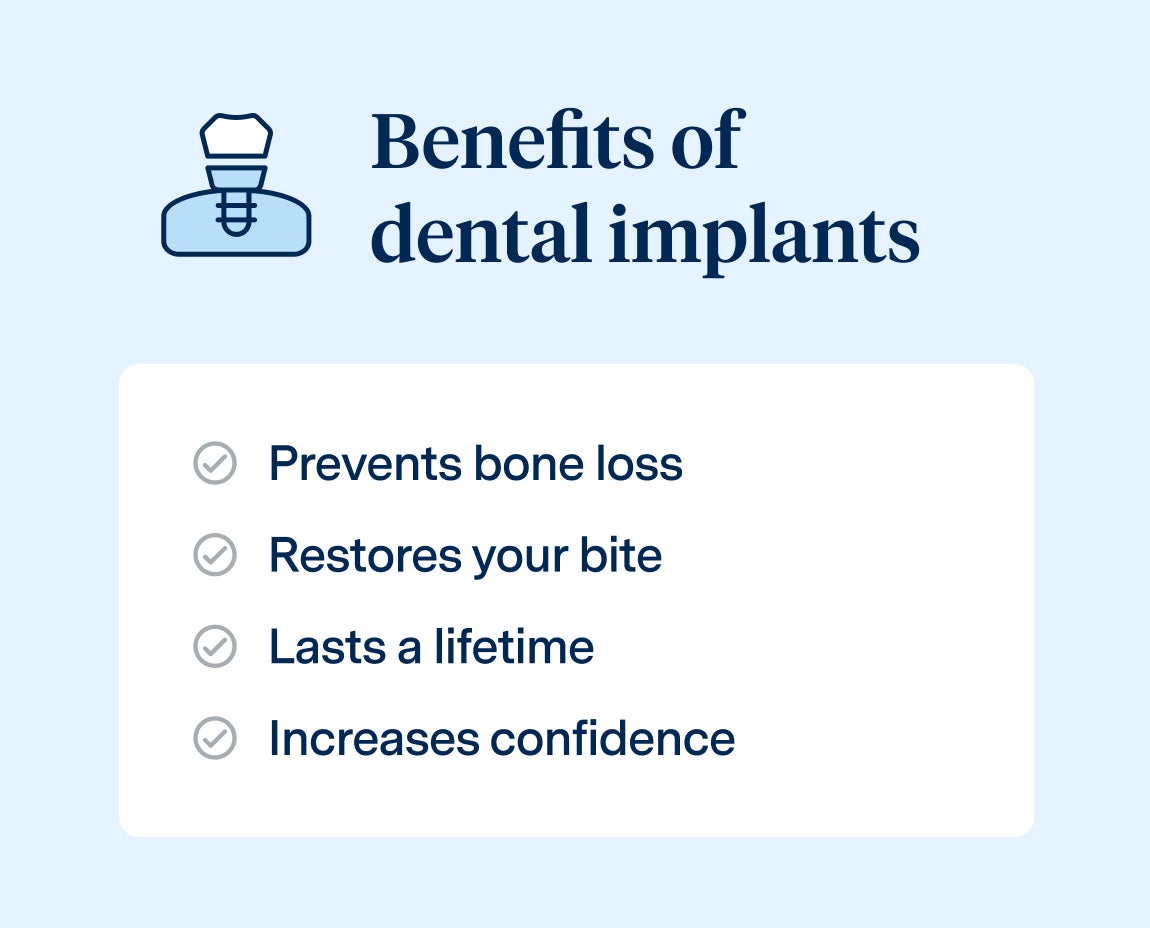
The long-term benefits of dental implants
While the thought of dental implants might be intimidating, the pain associated with the procedure is generally minimal and manageable. Some discomfort is to be expected, however, the pain associated with dental implants is generally manageable. The benefits of improved function, appearance and quality of life far outweigh the temporary discomfort. At Aspen Dental, we prioritize your comfort and well-being, using advanced techniques and personalized care to ensure a positive experience.

Take the next step towards a healthier, fuller smile
Ready to take the plunge? If you're considering dental implants and have concerns about pain, we invite you to book a consultation with our experienced team at Aspen Dental. We're here to answer your questions, address your concerns and guide you through every step of the process.
Schedule appointment >
